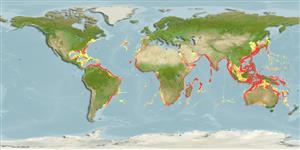Preferred temperature (Ref.
115969): 8.1 - 19.8, mean 12.9 (based on 1010 cells).
Phylogenetic diversity index (Ref.
82804): PD
50 = 1.5000 [Uniqueness, from 0.5 = low to 2.0 = high].
Bayesian length-weight: a=0.00479 (0.00347 - 0.00661), b=3.11 (3.02 - 3.20), in cm Total Length, based on LWR estimates for this species (Ref.
93245).
Trophic level (Ref.
69278): 4.0 ±0.0 se; based on diet studies.
устойчивость к внешним воздействиям (Ref.
120179): средний (среднего размера), минимальное время удвоения популяции 1.4-4.4 года (K=0.09-0.22; tm=2-3; tmax=15).
Prior r = 0.58, 95% CL = 0.38 - 0.87, Based on 2 full stock assessments.
Fishing Vulnerability (Ref.
59153): Moderate vulnerability (42 of 100).
Climate Vulnerability (Ref.
125649): High vulnerability (62 of 100).
